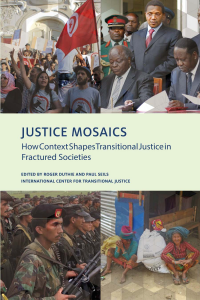The ICTJ have published a new volume discussing the importance of context in Transitional Justice implementation: Justice Mosaics: How Context Shapes Transitional Justice in Fractured Societies.
The book is wide-ranging and is the culmination of a multi-year project, including a series of workshops in New York in 2014. The book stresses the importance of understanding context and argues that, rather than conceiving of TJ as a set of tools, it should be understood as a series of mosaics, or processes arranged according to the circumstances in play. You can explore the book and associated resources here.
In my chapter on ‘Opportunities and Challenges’ I take what I think is a fairly pragmatic (and moderately pessimistic) approach, that ‘not only important to consider opportunities and challenges in context; it is also important to recognize that both
transitional justice and peace-building are processes of highly contingent and
imperfect transition. Just as there is no one-size-fits-all solution, there is also
no perfect solution to the problem of how to deal with a legacy of abuses, how-
ever context specific.
Dealing with past abuses in a delicate post-conflict setting can be at best complicated and at worst calamitous. The task is to ensure that we err on the side of the former, not the latter. Above all, we need to be realistic about what transitional justice can achieve, and honest about what it cannot.’


Leave a Reply
You must be logged in to post a comment.